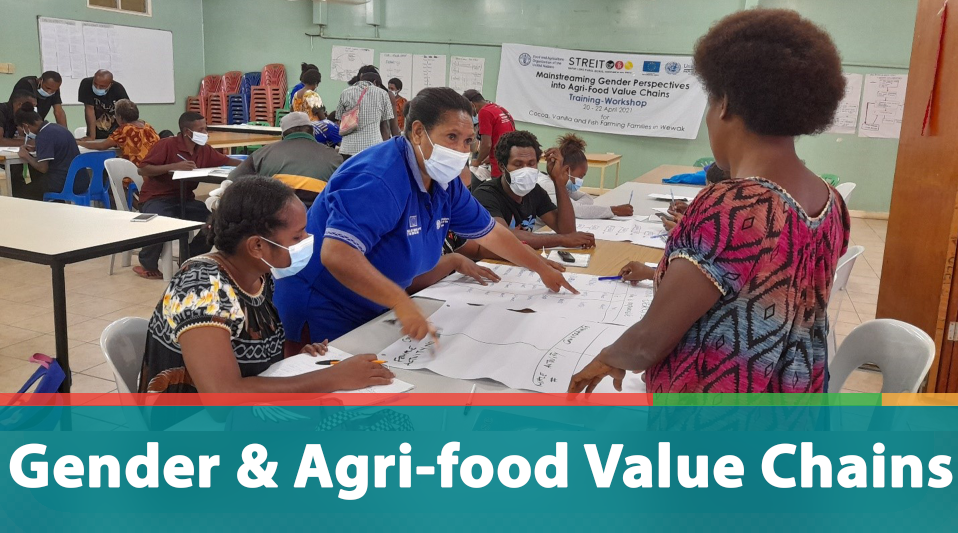
Ensuring that the European Union funded Support to Rural Entrepreneurship, Investment and Trade in Papua New Guinea (EU-STREIT PNG) Programme aligns with family values, is the focus of a three-day workshop organized by the gender and youth inclusion team.
The training for Cocoa, Vanilla and Fish Farming Families in Wewak District, under the theme “Mainstreaming Gender Perspectives into Agri-food Value Chains”, pulled together 32 participants (3 women, 12 girls, 14 boys and 3 elderly men) in a mind-boggling 3-day training workshop on Tuesday 20 to Thursday 22 April 2021, at the Sepik Centre of Hope in Wewak town.
The EU-STREIT PNG programme being implemented under the leadership of the Food and Agriculture Organization of the United Nations (FAO), as a Joint Programme and in close collaboration with the PNG Government and local partners with an emphasis on local agri-preneurs, considers Gender and Youth Inclusion as a critical factor affecting food security, nutrition and household incomes, and in its entirety, affects the sustainable development of agri-food value chains.
Moreover, the prevalence of gender based-violence (GBV) among cocoa/vanilla/fisheries communities also negatively impacts on efforts to encouraging economic empowerment and gender balance when it comes to decision making by individuals in family settings at the LLG, District and Provincial levels.
To address the above issues, topics such as Gender concepts, gender awareness, mainstreaming gender perspectives into agri-food value chains, agribusiness group and agri-cooperative creation and group dynamics and issues of gender-based violence within the cocoa, vanilla and fisheries communities were some key training topics.
“We’re here to talk about doing business as a family. This is to ensure that the interventions by the FAO and partners under this EU funded programme aligns with the family values which is the key to succeed in smallholder agriculture, agri-business and life in general,” explained Mrs Patu Shang, International Gender and Youth Inclusion Specialist for the Programme, during an introductory session.
During the training sessions, focus group discussions were held to bring out the gender-based constraints (GBC) in the fisheries and cocoa value chain as an example.
The exercise helped both the female and male participants understand how gender roles in a male dominated society like in the Sepiks, imposed by traditional norms, demarcate responsibilities starting in the household can lead to undervaluation of women’s contribution to the value chain, thereby denying the economic value of women and girls to contribute effectively in agriculture work and household income.
The sessions on financial literacy, familiarised participants with basic financial and budgeting concepts like income, expenditure, investment and savings and the importance of maintaining a financial diary starting at the household and farm level.
Participants were confident to share their challenges as well as what they learnt at the workshop and one was a 32-year-old female cocoa farmer and primary school teacher, Jayleen Wimari, from Uridogung Village, Wewak Rural LLG.
“My dream is to move on to another step. I want to make a difference after what I’ve learned from this training which has inspired me in many ways and I want to be somebody in my community,” said Mrs Wimari who owns a 200x400meter cocoa block with her husband.
One purpose of this training is for farmers to better understand the EU-STREIT PNG programme where women and youth with the support of men folks can participate actively and assertively as a family unit under the Cocoa, Vanilla and Fisheries value chains for a better and sustainable value chain development.
COVID-19 Measures and Guidelines were equally observed during the three days, with mandatory use of facemasks, social distancing and regular hand washing and sanitising by participants.
Participants were also drilled on COVID-19 Safety Measures that must be observed in homes and communities, particularly on how to properly use a facemask so that it does not end up being a source of infection but rather a source of protection against COVID-19.
The same training will be rolled out to other districts of East and West Sepik Provinces.
The EU-STREIT PNG is the largest grant-funded programme of the European Union in the country and the Pacific sub-region.
This agriculture rural development programme focuses on supporting smallholder cocoa, vanilla and fish farmers in the 10 districts of East and West Sepik Provinces.
